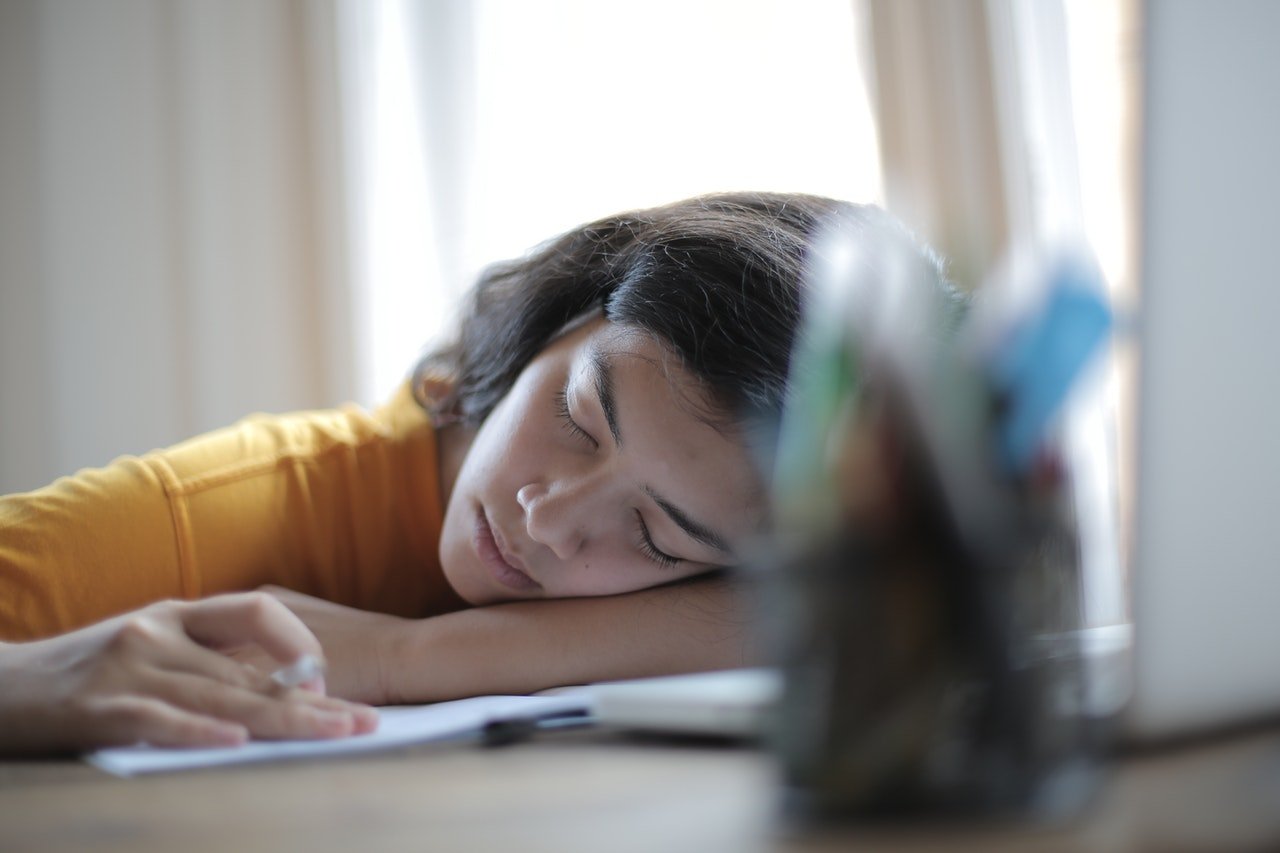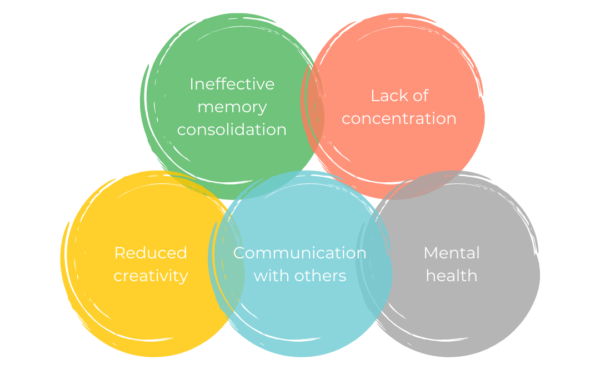We all know that foggy feeling the next day when we haven’t got enough sleep the night before. Whether it’s cramming for an exam, finishing homework or watching just one more episode of that latest Netflix series you’re totally hooked on, our sleep is what often gets sacrificed and there are several consequences to a lack of sleep.
So, we’ve had a chat with Sleep/Clinical Psychologist, Rosemary Clancy (Sydney Sleep Centre and Director of LetSleepHappen) to find out just how a lack of sleep can really affect you! Perhaps you’ll swap those books or laptop just a little bit earlier for your pillow.
So, let’s get started!
How much sleep should you be getting?
Effect #1: Ineffective Memory Consolidation
Effect #2: Lack of Concentration
Effect #3: Reduced Creativity
Effect #4: Communication with Others
Effect #5: Mental Health
How much sleep should you be getting?
As teenagers, it can be challenging to get enough sleep because you’re often pretty busy between school, co-curricular activities and hanging out with friends and family. However, it is recommended that teenagers (14-17 year olds) get between 8-10 hours of sleep!
Of course, this is just a guide and it may vary slightly for everyone depending on the person but it’s important to get enough sleep so you’re ready to take on the school day to the best of your ability.
Now, while you may think a few less hours of sleep are harmless and totally worth it to finish off that assignment or Netflix episode, it can actually have quite a significant impact on the way you and your brain functions the next day!
We’ll now explain 5 potential consequences of a lack of sleep, so you understand the importance of getting an adequate amount of sleep.
Think you’re not getting enough sleep? Learn about 5 signs that may indicate you need to spend more time hitting the hay here!
Effect #1: Ineffective Memory Consolidation
As a student, you’re always learning new information at school for all kinds of different subjects — and somehow you have to remember all of that information! It’s already quite a challenging task but when you add a lack of sleep into the equation, memorising becomes a lot trickier!
According to the Sleep Foundation, your learning abilities can decrease by up to 40% if you don’t get enough sleep — now that’s quite a lot.
REM Sleep
So, you’ve probably heard of something called REM sleep at some point. Don’t worry if you can’t remember what it is because Sleep Psychologist Rosemary explains it well!
“So sleep is divided into two categories — REM sleep, which is your dream sleep and non REM sleep, which is deep sleep and light sleep,” she said.
Rosemary explained how REM sleep is “really important for both emotion regulation and memory consolidation.” It helps you to consolidate memory and everything you’ve learnt into long term memory.
Now here is where it gets interesting!
“If you consistently miss the second half of the night, you’re going to consistently be missing REM sleep and that’s a problem because not only are you going to be irritable because of the need for the emotion regulation that REM sleep provides, but your memory will also be affected. If your memory consolidation isn’t working, then your new learning is affected,” Rosemary explained.
So, that’s how the whole lack of sleep cycle affects your memory and ability to learn!
Rosemary mentioned how “when you’re a teenager, you really need both of those parts of the night — you need all of those sleep stages.”
Effect #2: Lack of Concentration
Have you ever found yourself sitting at your desk, trying to write that essay but instead you’re somewhere else? Perhaps checking your phone, daydreaming out the window or rewriting that same sentence over and over again — we know the struggle!
Well, not getting enough sleep can really affect your level of concentration which is definitely needed when it comes to learning!
According to the Sleep Foundation, if the brain doesn’t have enough time to recover, the “neurons become overworked” which limits your ability to properly think.
For you to really understand the extent of this, we’ve found an interesting example from the Sleep Health Foundation that helps put it into context: “In fact, if you have been awake for 18 hours, your reaction time and ability to concentrate is similar to a blood alcohol concentration of 0.05%”. So, not getting enough sleep can really affect your ability to think and concentration!
Effect #3: Reduced Creativity
Now, this consequence of a lack of sleep doesn’t come as a surprise — being able to think creatively and come up with innovative ideas requires a good night of sleep so that the mind is refreshed!
You’ve probably heard the term “sleep on it” in regards to when you’re trying to make a decision or find a solution to something. Well, there definitely is some truth in that!
Effect #4: Communication with Others
“If you’re tired and cranky, your communication with others is affected to a point,” Rosemary said.
If you don’t get a good night’s sleep or enough sleep, you probably won’t be in the best mood the next day which can affect the way you communicate with others and relate to them.
Whether it’s your peers, teachers or parents, a lack of sleep can impact your relationship with them! These relationships during your schooling are really important because they’re your support system.
Effect #5: Mental Health
Rosemary spoke to us about the “reciprocal relationship between poor sleep, depression and anxiety.”
Some people also stress about trying to get enough sleep which can also play into their anxiety.
So, like most teenagers, perhaps you’re a night owl and you’ve realised you need to start going to bed earlier because you’re exhausted from constantly staying up late.
Well, it will actually take a little bit of time before your body can re-adjust to this new time which can also affect your mental health.
Rosemary explains the reasoning behind this: “They find themselves lying in bed or wake up getting frustrated because they did the right thing, they got into bed early, they went to bed two hours early, and they can’t get to sleep — and that’s because of the core body temperature.”
So, your body actually has to re-adjust so that you can feel sleepy earlier — pretty crazy stuff!
There are also a lot of studies that look at the relationship between sleep deprivation and mental health. One study by Growing Up in Australia found that 12-17 year olds who weren’t getting the required amount of sleep “were more likely to show symptoms of anxiety and depression and were less likely to report being happy”.
And that’s it!
So, remember, sleep is really important for you to be able to function to your full capacity and to avoid these consequences of a lack of sleep! Make sure you aim to get those 8-10 hours each night.
If you’re searching for additional wellbeing resources, check out some our articles below:
- How to Study for the HSC When You Have Insomnia
- 5 Signs You’re Depressed and What You Can Do About Your Mental Health
- 3 Biggest Causes of Stress for Students During the HSC
Tanna Nankivell is a Senior Content Writer at Art of Smart Education and is currently in Germany completing a year of study for her double degree in Communications (Journalism) and Bachelor of Arts (International Studies). She has had articles published on Central News – the UTS Journalism Lab and wrote a feature piece for Time Out Sydney during her internship. Tanna has a love for travel and the great outdoors, you’ll either find her on the snowfields or in the ocean, teaching aqua aerobics or creating short films.





